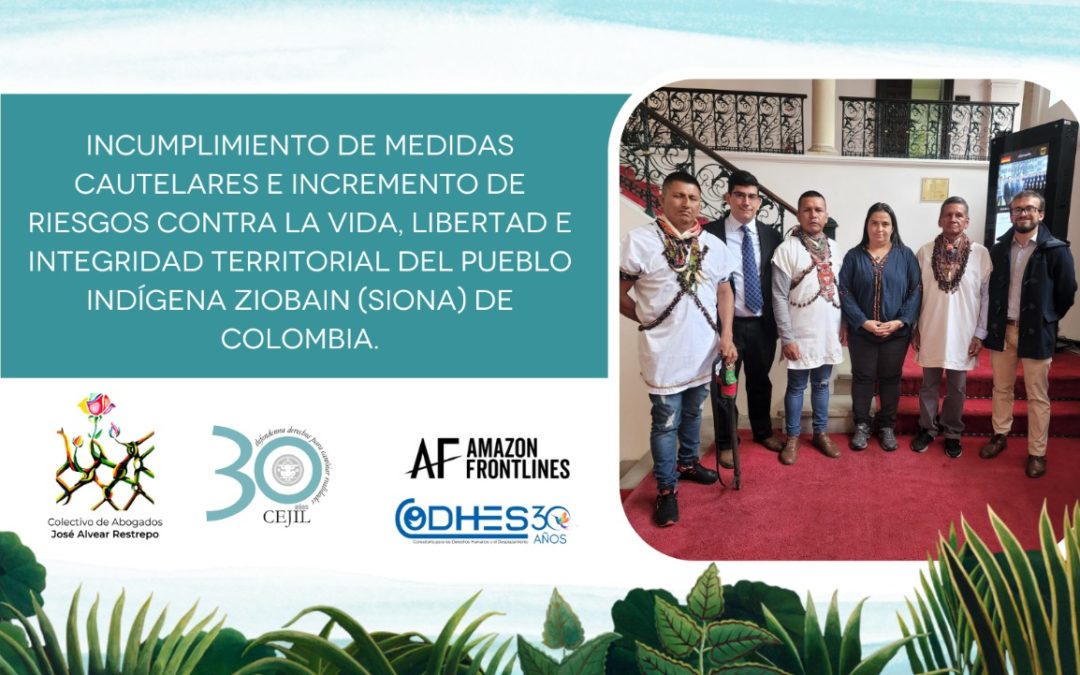Puerto Asis, Putumayo, Colombia. April 27, 2022
On July 14, 2018, the Inter-American Commission on Human Rights (IACHR) granted precautionary measures in favor of the authorities and members of the Gonzaya (Buenavista) and Po Piyuya (Santa Cruz de Piñuña Blanco) Resguardos of the Siona Indigenous People, in the department of Putumayo in Colombia, as it considered, as reported by the petitioners, that they are in “imminent process of extermination”.
Consequently, in accordance with Article 25 of the IACHR Rules of Procedure, the Commission requested the State of Colombia to adopt the necessary and culturally appropriate measures to safeguard the life and personal integrity of the families of the Resguardos and to create the conditions for them to live safely in their territory, without being subjected to violence, threats or harassment.
However, since the granting of measures, there is no real progress regarding the material and immaterial protection proposals presented by the beneficiaries of the Gonzaya (Buenavista) and Po Piyuya (Santa Cruz de Piñuña Blanco) Resguardos of the Siona People, there are no guarantees of compliance, surveillance, implementation of protection measures, nor is there evidence of a differential ethnic approach in the few state interventions. The state institutionality, obliged to protect and safeguard the beneficiaries, pretends to impose the institutional offer (general projects) as the suitable measures to comply with its obligation.
The situation is extremely serious considering that the risks have increased in recent years: there are new paramilitary and narco-paramilitary structures in the territory that are in armed confrontation among themselves and with the National Army, generating combat, confrontations, harassment, planting of anti-personnel mines, restrictions on mobility, confinement, imposition of “coexistence manuals”, threats and stigmatization.
Likewise, the implementation of forced crop eradication without consultation processes and the use of the protected territory and community facilities for camping activities generate conditions of risk. The irregular and arbitrary incursion of the army as part of the government’s anti-drug policy puts at risk the physical and psychological integrity of all the inhabitants of the Resguardo as well as their territoriality, the material and spiritual basis of their culture.
At the same time, mining extractivism activities carried out by the oil company GEOPARK (formerly AMERISUR) generate dumping and contamination risks in the estuaries, impacting ecological cycles and structures and militarizing the territories. As if the above were not enough, there is a great advance of deforestation for the planting of illicit crops that occurs through territorial dispossession by peasant colonization linked to expansion of the coca frontier, which is why the human rights defender, Lina Maria Espinosa, received threats from armed actors who claimed “interference” to their interests linked to the expansion of coca and imposition of territorial control.
The aforementioned situations keep the communities in constant confinement, thus limiting the food and cultural survival activities (fishing, hunting, ceremonies) typical of this indigenous people and hindering the work of the organizations that represent them.
For its part, the State, through its institutions, continues to ignore the criteria and evidence of seriousness, urgency, imminence of risks and does not assume an active role in the compliance of precautionary measures. It is of concern that there is no response to the progress of the disciplinary complaints and criminal proceedings on the facts of risk and violations of the rights of members of indigenous communities, because as established by the IACHR Court, impunity encourages the repetition of the facts.
For all of the above reasons and in accordance with Resolution 002/20 of April 15, 2020, we request that the IACHR conduct an on-site visit to the ancestral territory and issue a resolution to follow up on the precautionary measures in response to the increase in the risk situation of the Siona People, their Authorities, Indigenous Guard and one of their companions and technical advisor, in which it orders the Colombian State to immediately implement the precautionary measures in accordance with the uses and customs of the Siona People, in particular their special relationship with the ancestral territory, and to extend them in favor of the human rights defender Lina María Espinosa due to the aforementioned risk.
Centro por la Justicia y el Derecho Internacional -CEJIL-
Amazon Frontlines
Colectio de Abogados José Alvear Restrepo -Cajar-
Consultoría para los Derechos Humanos y el Desplazamiento -Codhes-

